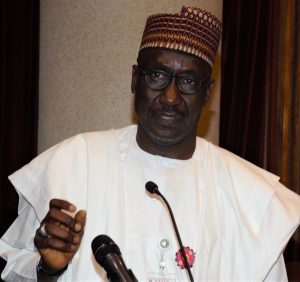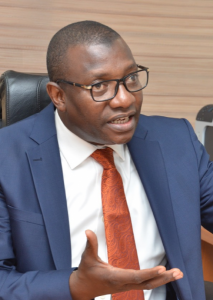Oil
NNPC records trading surplus of ₦5.20billion in August, as PPMC distributes 1.92bn Liters of PMS

Yemie ADEOYE
Houston Tx- THE Nigerian National Petroleum Corporation (NNPC) has announced an increased trading surplus of ₦5.20billion for August, 2019, reflecting an increase of 22 per cent when compared with the ₦4.26billion-surplus posted in July 2019, a release by NNPC Acting Group General Manager, Group Public Affairs Division, Mr. Samson Makoji, has said.
This is coming just as the Petroleum Products Marketing Company,PPMC, a subsidiary of the NNPC announced the distribution of over 1.92 billion liters of premium motor spirit, PMS, popularly called petrol within the period under review.
The new figures are contained in the recently released August 2019 edition of the NNPC Monthly Financial and Operations Report (MFOR) of the National Oil Company.
The report attributed the appreciable increase of 22 per cent within the period under review to, largely, the improved surplus posted by the Nigerian Petroleum Development Company (NPDC).
It explained that the percentage increase in performance of the company evened out with the decline in the performance of Nigeria Gas Company (NGC) vis-à-vis July, 2019 figures, even as it added that the increased surplus posted by Duke Oil and the reduced deficit by the Nigerian Pipelines and Storage Company (NPSC) equally bolstered the figures for the month, according to the report.
Stating a summary of NNPC’s Group Operating Revenue and Expenditure for August 2019, the August report indicated that it increased by 7.58 per cent at ₦540.60billion, reflecting an increase of ₦38.10billion compared with the previous month’s performance.
It further stated that the expenditure for the month followed a similar trend with increase of 7.46 per cent or ₦37.16billion, to reach ₦535.40billion during the year under review, declaring that the proportion of expenditure to revenue is almost at par for the current month as well as in July 2019.
In the Downstream Sector of the corporation’s operations, the 49thedition of the NNPC MFOR stated that ₦233.42billion was made on the sale of white products by the Petroleum Products Marketing Company (PPMC), the Downstream subsidiary of the National Oil Company, in August 2019, compared to ₦214.70billion sales in July, 2019.
Total revenues generated from the sales of white products for the period August 2018 to August 2019 stood at ₦2,687.29billion, with PMS contributing about 95.19 per cent of the total sales valued at ₦2,558.13billion.
Volume wise, 1.917billion litres of white products were sold and distributed by PPMC in the month under review, compared with 1.744billion litres in July 2019.
This comprised 1.92billion litres of PMS and 0.00030billion litres of Automotive Gas Oil, otherwise called diesel. Total sale of white products for the period: August 2018 to August 2019 stood at 21.49billion litres, with PMS accounting for 20.82billion litres or 96.9 per cent.
In the Gas Sector, out of the 1,174.97Million Standard Cubic Feet of (mmscfd) of gas supplied to the domestic market in August 2019, about 666.15mmscfd of gas representing 56.69 per cent was supplied to Gas-Fired power plants while the balance of 508.82mmscfd or 43.31 per cent was supplied to other industries.
Similarly, for the period: August 2018 to August 2019, an average of 1,211.08mmscfd of gas was supplied to the domestic market, comprising an average of 723.77mmscfd or 59.76 per cent as gas supply to power and 482.32mmscfd or 40.24 per cent as gas supply to industries.
Oil
NNPC Targets 60% Methane Emission Reduction By 2031
The Nigerian National Petroleum Company Limited (NNPC) has unveiled a bold strategy to reduce methane emissions in the oil and gas sector by 60% by 2031, with an ultimate goal of achieving net-zero emissions by 2060.
This announcement reinforces Nigeria’s leadership role under the Global Methane Pledge initiative and its commitment to tackling climate change.
The Group Chief Executive Officer of NNPC, Mele Kyari, disclosed these plans during a meeting on Thursday with Robert Leahman, the U.S. State Department’s Global Methane Program Manager, and a delegation from Deloitte.
READ MORE: Atiku Gloats Over AUN’s Achievements Ahead Of 20th Anniversary
The discussions, held at the NNPC Towers in Abuja, focused on collaborative efforts to reduce methane emissions through innovative and sustainable practices.
“Reducing methane emissions is not just an environmental necessity but also a strategic imperative for Nigeria’s energy transition. We are leveraging partnerships to adopt global best practices and innovative solutions,” Kyari stated.
Key among these efforts is a pilot project in the Niger Delta, aimed at establishing emissions baselines, mitigating methane leaks, and promoting sustainable operations across Nigeria’s energy sector.
The project, a partnership between NNPC, Deloitte, and the U.S. Bureau of Energy Resources, will utilize data-driven methodologies to pinpoint and address methane hotspots.
Robert Leahman commended Nigeria’s proactive stance, describing it as a benchmark for other nations on the continent.
“Nigeria’s leadership under the Global Methane Pledge sets a standard for the continent. These initiatives will not only help reduce emissions but also drive sustainable development in the energy sector,” he said.
Kyari highlighted the broader benefits of addressing methane emissions, noting its significance for both environmental protection and economic efficiency.
“This collaboration is a game-changer. By addressing methane leaks, we’re reducing waste, saving costs, and protecting the environment. It’s a win-win for our economy and the planet,” he added.
Oil
FG Introduces New Incentives To Revitalize Nigeria’s Oil & Gas Industry
In a strategic move to revitalize Nigeria’s oil and gas sector, the Federal Government has unveiled two key fiscal incentives aimed at attracting investment and enhancing energy security.
The announcement was made by Mr. Wale Edun, the Minister of Finance and Coordinating Minister of the Economy on Wednesday.
The first initiative, the Value Added Tax (VAT) Modification Order 2024, introduces critical exemptions for essential energy products and infrastructure, including Diesel, Feed Gas, Liquefied Petroleum Gas (LPG), Compressed Natural Gas (CNG), Electric Vehicles, Liquefied Natural Gas (LNG) infrastructure, and Clean Cooking Equipment.
Read Also: Atiku Calls For Rotational Presidency Across Nigeria’s Geopolitical Zones
These exemptions are designed to reduce living costs for Nigerians, promote energy security, and accelerate the transition to cleaner energy alternatives.
The second initiative, the Notice of Tax Incentives for Deep Offshore Oil & Gas Production, offers new tax relief options for deep offshore exploration projects.
This measure aims to position Nigeria’s deep offshore basin as a premier destination for international oil and gas investments, boosting the country’s appeal to foreign investors.
These reforms are part of a broader set of policy initiatives, known as Policy Directives 40-42, endorsed by President Bola Ahmed Tinubu.
The directives reflect the administration’s commitment to fostering sustainable development in the energy sector and enhancing Nigeria’s competitive edge in the global oil and gas market.
Business
Tinubu set to approve ExxonMobil-Seplat oil deal, expands CNG bus initiative

By Yemie Adeoye
NIGERIA’s President Bola Tinubu has announced that the protracted ExxonMobil-Seplat upstream oil divestment will be formally approved by the Minister of petroleum within a matter of days, just as he announced his government’s intention to expand the Compress natural Gas, CNG buses initiative.
The President who stated this during his Independence day nationwide broadcast stated that the move is in line with his administration’s commitment to free enterprise, free entry and free exit in investments which is the hallmark of his administration investment policy.
“Fellow compatriots, our administration is committed to free enterprise, free entry, and free exit in investments while maintaining the sanctity and efficacy of our regulatory processes. This principle guides the divestment transactions in our upstream petroleum sector, where we are committed to changing the fortune positively. As such, the ExxonMobil Seplat divestment will receive ministerial approval in a matter of days, having been concluded by the regulator, NUPRC, in line with the Petroleum Industry Act, PIA. This was done in the same manner as other qualified divestments approved in the sector.”
The President also seized the opportunity to plead with Nigerians to be patient with his administration’s reform policies. “As your President, I assure you that we are committed to finding sustainable solutions to alleviate the suffering of our citizens. Once again, I plead for your patience as the reforms we are implementing show positive signs, and we are beginning to see light at the end of the tunnel”.
“Our energy transition programme is on course. We are expanding the adoption of the Presidential Initiative on Compressed Natural Gas for mass transit with private sector players. The Federal Government is ready to assist the thirty-six States and FCT in acquiring CNG buses for cheaper public transportation.
Fellow Nigerians, while we are working to stabilise the economy and secure the country, we also seek to foster national unity and build social harmony and cohesion. Our economy can only thrive when there is peace”. he enthused.















